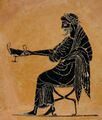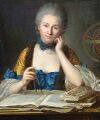Template:Selected anniversaries/December 17: Difference between revisions
No edit summary |
No edit summary |
||
| Line 15: | Line 15: | ||
||1833 – Kaspar Hauser, German feral child (b. 1812) | ||1833 – Kaspar Hauser, German feral child (b. 1812) | ||
||Felice Casorati (b. 17 December 1835) was an Italian mathematician who studied at the University of Pavia. He was born in Pavia and died in Casteggio. | |||
He is best known for the Casorati–Weierstrass theorem in complex analysis. | |||
||1842 – Sophus Lie, Norwegian mathematician and academic (d. 1899) | ||1842 – Sophus Lie, Norwegian mathematician and academic (d. 1899) | ||
Revision as of 18:45, 5 November 2017
500 BC: Dionysus gives speech which anticipates the coming of Saturnalia.
497 BC: The first Saturnalia festival celebrated in ancient Rome.
1706: Mathematician and physicist Émilie du Châtelet born. She will translate and comment upon on Isaac Newton's Principia Mathematica.
- He is best known for the Casorati–Weierstrass theorem in complex analysis.
1855: Set theorist and crime-fighter John Venn devotes himself to fighting crimes against mathematical constants.
1900: Mathematician and academic Mary Cartwright born. She will do pioneering work in what will later be called chaos theory.
1907: Lord Kelvin dies. He did much to unify the emerging discipline of physics in its modern form.
1938: Physicist Otto Hahn discovers the nuclear fission of the heavy element uranium, the scientific and technological basis of nuclear energy.
1977: High-energy literature used during Saturnalia for the first time.







